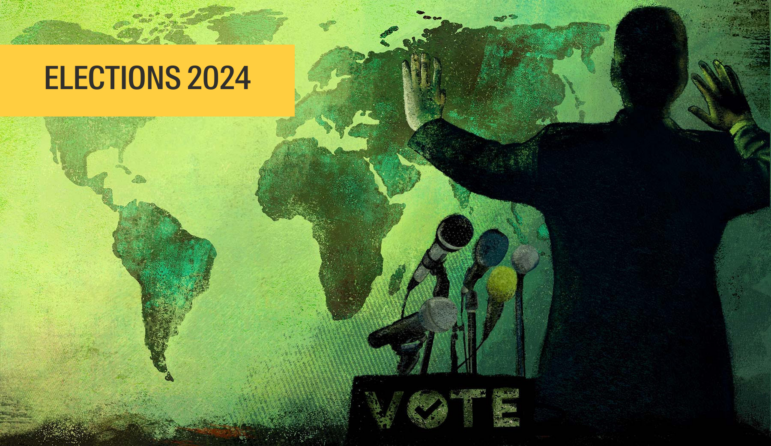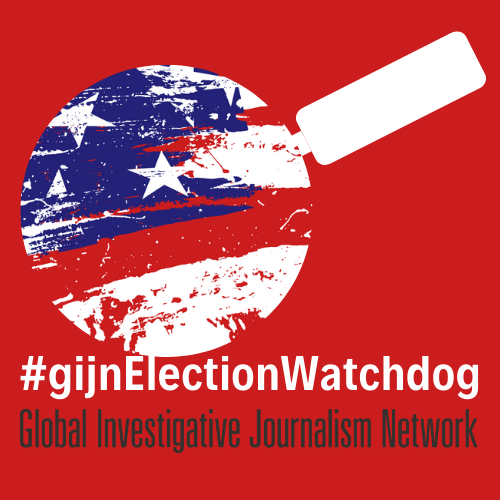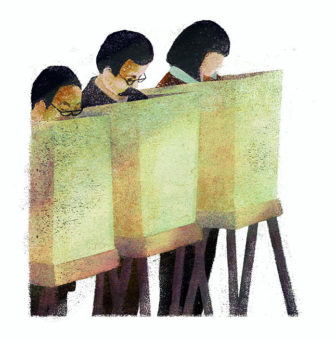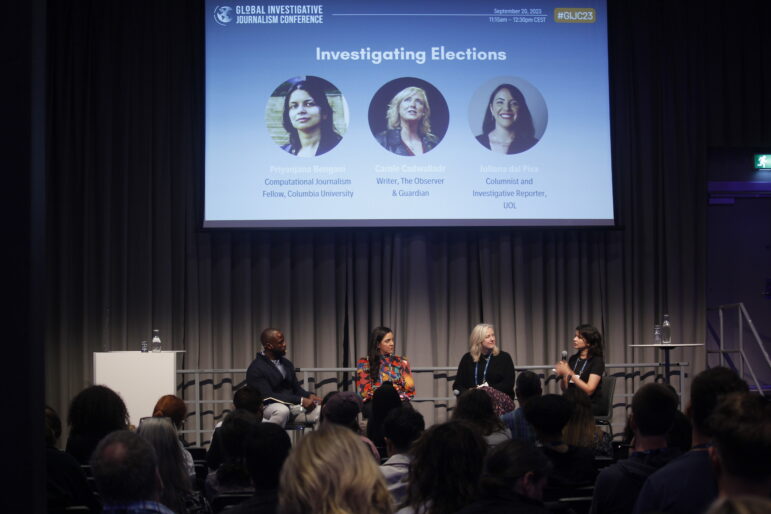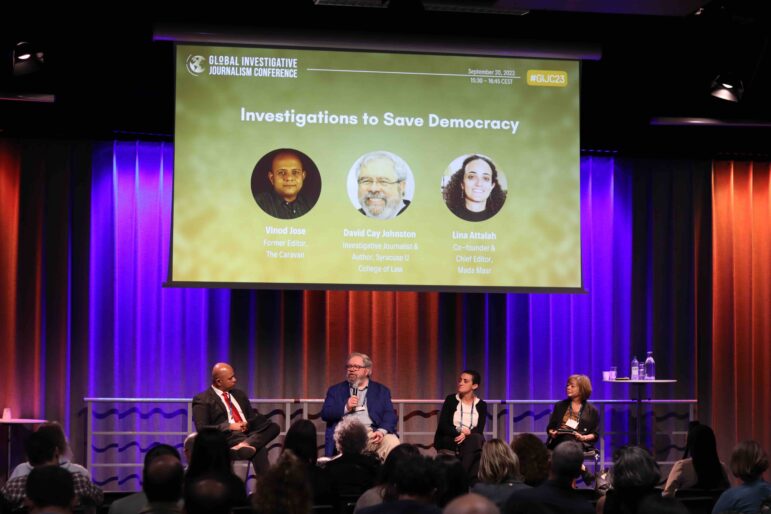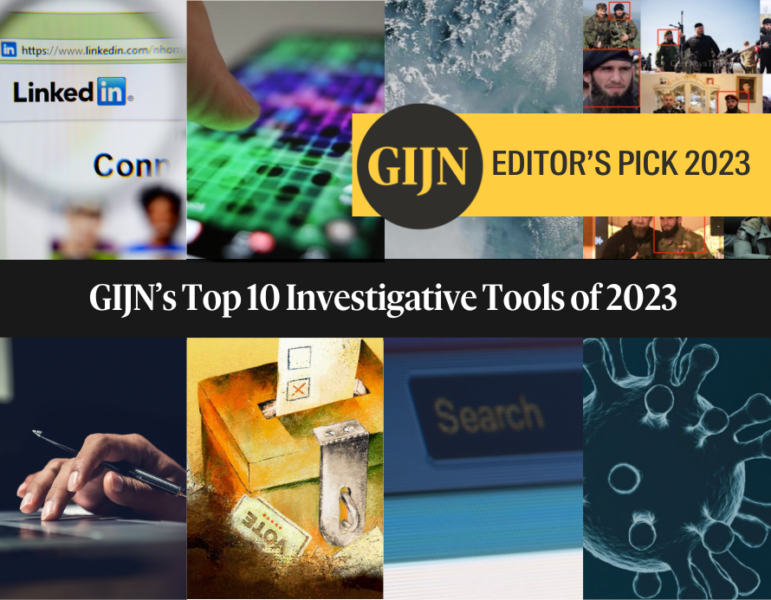

Illustration: Marcelle Louw for GIJN
Revised Elections Guide for Investigative Reporters: Preparing for Elections
Read this article in
Chapter Guide Resource
Revised Elections Guide for Investigative Reporters: Where to Begin
Chapter Guide Resource
Revised Elections Reporting Guide for Investigative Reporters: New Digging Tools
Chapter Guide Resource
Revised Elections Guide for Investigative Reporters: Preparing for Elections
Chapter Guide Resource
Revised Elections Guide for Investigative Reporters: Investigating Candidates
Chapter Guide Resource
Revised Elections Guide for Investigative Reporters: Political Messaging and Disinformation
Editor’s Note: This reporting guide has been updated and revised for the 2024 election cycle. It was originally published in 2022 and the previous version of this chapter can be read here.
In past years, investigative reporters in many countries have scrawled terms like campaign finance cheating, nepotism, conflicts of interest, ballot stuffing, and false claims on their newsroom planning whiteboards as issues to target ahead of elections.
However, as populists, corrupt allies, and far-right movements copy tactics from each other and exploit weaknesses in social media platforms and phone communications — while political violence and disinformation become common — there is now a slew of additional anti-democratic phenomena for investigative journalists to watch for.
In the months (and even years) before a ballot is cast, watchdog election reporters should also be looking into things like foreign influence operations, dark PR, voter list purges, speech deepfakes, voter suppression laws, astroturfing, zero-click surveillance, and state-driven smears, where government agents pass their secret surveillance of politicians or journalists to media allies, as has happened in countries such as Serbia.
Closer to election day, reporters should shift their attention from strategic to more tactical misconduct, alert for things like voter fraud vigilantism, denial-of-service cyber attacks, militia intimidation, partisan polling station closures, election official doxxing, and swatting. (A brand new election threat in 2024: “swatting” involves fake emergency service reports of shootings at the homes of politicians or partisan officials in order to summon armed police to those addresses, creating dangerous situations and potentially negative headlines. Armed police were summoned to the homes of several prominent politicians and public officials in the United States just in December 2023 and January 2024 as a result of fake reports by partisan activists, and experts worry that this tactic will not only expand closer to elections but also be copied by activists in other at-risk democracies.)
So, to prepare for 2024 and 2025, watchdog journalists need to expand their investigative subject menus, while also understanding the existing legal boundaries of their election contests and the new digital threats faced by themselves and their sources.
National elections are supposed to be credible, fair contests for the right to govern that are adjudicated by laws, and decided by properly informed voters. Investigative reporters examine the gap between what should happen and what actually is happening in these contests, and who is behind efforts to subvert the will of the people. However, as noted in this guide’s introduction chapter: many repressive countries use autocratic laws and the threat of state reprisal to run sham elections, which are worthless as a measure of the will of citizens, but dangerous as a source of propaganda and additional oppression.
Experts say preparing to investigate the gap between what should and does happen in campaigns involves learning the rules and laws that govern the contest; setting up tools and methods to keep you, your data, and your sources safe; and listing the trends, sources, and threats that could trigger worthwhile enterprise stories and investigations.
One inherent risk with a democratic system is that it is possible for a legal majority of citizens to voluntarily choose autocratic leadership, which could deny future electorates from making democratic choices at all. While such a choice is their right as voters, it is highly unlikely that they intend to disenfranchise themselves and future citizens — so it is up to journalists to use compelling evidence and sources to show them the possible perils of embracing autocracy and the potential vulnerability of their constitutions, institutions, and laws. Because true democracy requires a properly informed electorate. One such example: in December 2023, The Atlantic devoted its entire edition to deeply researched stories by two dozen experienced journalists on the impact a second Donald Trump administration would likely have on every aspect of US society based on evidence from his first four years in power. This kind of forward-looking reporting provides a useful insight into some of the classic steps that so-called elected autocrats can use to hold onto power in democratic nations — and also reveals the alarming limits of well-intentioned laws when partisan officials are willing to violate their oaths.
Experts say it’s important for editors — when planning their investigative priorities — to identify democratic “tipping-points” for political parties, where either a ruling party will no longer tolerate critical opposition, or a major political party will simply give up on trying to persuade new voters at all. Parties in the latter case will instead concentrate on using unethical or even illegal tactics to suppress support and voting access for its rival parties, and on maximizing its own voter turnout through misleading and alarming claims. This can happen, for instance, when a party concludes that its policy platform cannot compete with changing demographics in an electorate. This no-persuasion strategy can be especially effective in elections that are run by political parties, rather than independent election commissions.
In this chapter, we highlight both the rules and technical trends that reporters need to be aware of, such as how voting procedures are changing in different regions and how to spot evidence of foreign interference. We also offer tips for safety and tools for handling the sometimes compressed election calendar, as well as a framework for how journalists can monitor creeping authoritarianism in democracies, including a list of anti-democratic tactics that autocrats increasingly use to tip elections their way.
Laying the Groundwork
Know the Rules
Roughly half the countries that hold elections use proportional representation models, in which parliamentary seats are allocated to a party according to its percentage of the overall vote, giving smaller parties a greater chance of influencing new laws. Roughly a quarter of claimed democracies use winner-take-all models — where electoral districts have only one representative, and the candidate winning a plurality of the vote is elected — and another quarter feature a combination of the two basic systems. (See the variety of subtle differences between systems in this database). As mentioned: some nations purport to follow one of these democratic models but, in fact, operate blatantly sham elections, where the result is structurally rigged. But with each election, investigative journalists must confront unique rules that often change. Below is a list of resources for understanding your country’s local ground rules.
- Familiarize yourself with the laws and processes for local electoral management, constitutional provisions, and civic organizations in each country. Also check sites like the Electoral System Design Database, compiled and updated by the International Institute for Democracy and Electoral Assistance (International IDEA). This resource offers detailed and comparative data on the election architecture of 217 countries and territories.
- The ACE Electoral Knowledge Network collects electoral data from more than 200 countries, on 11 polling-related topics.
- Country-specific election handbooks. For instance, the comprehensive Dataphyte Handbook on Data-driven Election Reporting for Nigeria, or the new manual for covering Zimbabwe’s elections, from the Zimbabwe Media Commission. For young reporters new to the campaign trail in Africa, see Jamlab’s general tipsheet for election coverage.
- The Open Election Data Initiative sets out the mechanics of election processes in detail and offers some useful campaign finance case studies from Latin America. Ask local academics, pro-democracy NGOs, election experts, and election monitoring groups – like the 251 groups listed here — to share updated links for the rules that are supposed to govern your local contest.
- Learn about the voting equipment and vendors earmarked for the coming election. While The Verifier database created by the VerifiedVoting nonprofit is US-specific, this easily searchable tool contains remarkably granular detail about everything from commercial ballot-marking devices and internet voting systems to optical scanners and electronic poll books — many of which are also used in other countries’ elections.
- Learn the history of key elections. Find your country’s voter participation history in this excellent, global Voter Turnout Database. In addition to local election management archives and media research tools like LexisNexis, check out the privately compiled Adam Carr’s Election Archive, which — while not comprehensive — integrates global election results and statistics with maps, and preserves some historic data removed from electoral body websites.
Know the Referees
- Check out the authority and makeup of the election managers at sites like Electoral Management Design Database, from International IDEA. This includes searchable data on election bodies and commissions, terms of office, select officials, and appointment mechanisms.
- Devote time at the start of the election cycle to identifying two or three key election officials, developing relationships with them, and exchanging phone numbers. Veteran political reporters stress that election officials are swamped during active voting periods, and hard to reach unless they know you — and that these people will be crucial sources for understanding both the rules and problems in the process.
- Set up Twitter/X account lists of election officials. First Draft reporter Diara Townes has compiled an updated list of Twitter feeds for 47 of 50 US state secretaries of state, who serve as the top election officials in those US jurisdictions. With this resource, reporters could view in one virtual location these officials’ real-time concerns and decisions. Experts also recommend creating Twitter lists of well-connected political reporters, especially those in far-flung provinces or states. For instance, in the same US election, The Washington Post compiled a list of leading political journalists to follow in each US state in this Twitter list.
- Review the basic principles of the media’s role in elections — and international norms on issues from campaign hate speech to media regulation — in the United Nations Development Programme’s detailed Media and Elections guide.
Scrutinize Early Campaign Hires
Increasingly, populist political parties or campaign allies — or foreign autocratic powers — hire so-called dark public relations agencies early in election cycles and task them with sullying the reputations of activists and officials who support the rival party. Reporters have found that some of these agencies offer lucrative contracts to social media influencers to spread innuendo and gossip — and say that the source of funding for these campaigns is often a good target for investigative journalists. In his chapter for GIJN’s Reporter’s Guide to Investigating Digital Threats, Guatemalan journalist Luis Assardo noted that some PR agencies around the world have responded to this market by creating their own professional social media troll factories for election goals, as an El Pais investigation into Mexico’s most recent presidential election found: “In the Philippines, it’s common for campaigns to hire marketing agencies that specialize in using trolls to spread propaganda and attack the opposition,” Assardo also added. He also cautioned reporters to beware of the appearance of popular support for false election narratives, as this could be the artificial result of “astroturfing” tactics, which often yoke multiple fake accounts together to create the illusion of broad credulity. Tip: Assardo recommended the use of “listening tools” such as Brandwatch, Meltwater, Brand24, and Talkwalker to identify troll campaigns by tracking specific hashtags and keywords.
Practice Advanced Search Techniques Early in the Campaign Cycle
Effective online search will be essential if you find yourself in the investigative crunch time of the final weeks of elections. So, for those who have not yet already done so, it is important for reporters to learn and practice key online search techniques (powerful shortcuts that require no advanced computer skills) at the outset of election cycles. One concise resource that experienced journalists recommend is GIJN’s Advanced Search Techniques tipsheet by BBC online sleuth Paul Myers, which features the kind of search-focusing tips that will help almost any digging project. For a deeper dive into open source resources for election investigations and searching social media, see GIJN’s new, comprehensive Online Research Guide by Henk van Ess.
Safety in Election Reporting
Truth-telling journalists, as well as their data and sources, can become targets for election bad actors who don’t want voters to know the facts. Therefore, good digital hygiene and smart safety precautions are essential. Here are some best practices to follow.
- Enable “lockdown mode” on your iPhone. In his keynote address to the 13th Global Investigative Journalism Conference (#GIJC23), Ron Deibert, founder and director of the Citizen Lab cyber security research unit at the University of Toronto, described a multitude of covert surveillance threats that now face independent journalists around the world. Deibert warned that new zero-click hacking technologies such as Pegasus can hack journalists’ phones without any action on their part — and without leaving a trail — and gain access to not only their communications but their phone cameras and microphones as well. Despite the bleak nature of the threats, he still specifically recommended that reporters with iPhones enable “lockdown mode,” as no Pegasus infections had yet been recorded on phones running on that security mode.
- Know, expose, and defend against rampant gendered harassment. The recent International Center for Journalists (ICFJ) case study on the shocking, continuous harassment campaign against India-based journalist Rana Ayyub — from Islamophobic abuse to death- and rape threats — illustrates the threat of online violence increasingly faced by female-identifying political reporters. In her case, this included trumped-up prosecutions driven by India’s ruling party, physical surveillance, and a coordinated harassment campaign on Twitter. Notably, the ICFJ report found chilling parallels with the state-sponsored persecution of Rappler founder and Nobel Peace Prize laureate Maria Ressa in the Philippines, and warned that autocrats now share a “playbook” of tactics to attack independent women journalists. One important investigation by the Guardian showed how the law itself is being weaponized against women reporters in countries like India. The ICFJ authors noted that Ayyub’s case was “emblematic of the targeting of female journalists in the country. The hallmarks of these attacks are the digital ‘lynch mobs’ that align themselves with India’s Hindu nationalist ruling party. Such attacks are invariably overtly misogynistic and disinformation-laced.”
- In addition to UNESCO’s report on the crisis — “The Chilling: What More Can News Organizations Do to Combat Gendered Online Violence?” — female reporters can find dozens of resources to mitigate these threats in the safety chapter of GIJN’s Resources for Women Reporters guide. GIJN has also compiled a general resource page of safety guides and organizations that provide aid to journalists in danger.
- Cyber safety dashboard. Find a suite of free or low-cost password managers, malware protections, and encryption tools in the comprehensive GCA Cybersecurity Toolkit for Journalists, which was developed with the particular threats related to elections in mind. Assess the digital hygiene options that suit your location or skill level best in GIJN’s Digital Security guide.
- Encryption on your devices. There are many excellent free options, but most experts endorse Signal for communications, Protonmail for emailed documents, post office boxes for paper documents, and VeraCrypt for devices at risk of physical seizure.
- Physical surveillance. If you suspect you or your sources are being physically followed by agents of political campaigns, special interest groups, or political extremists, then consider the tips and steps set out in this GIJN story. However, if you suspect you’re being followed by police or state intelligence agents, then consult human rights lawyers, or human rights security nonprofits, like Citizen Lab or Electronic Frontier Foundation — or, as a worst-case scenario, actively consider leaving the country. Check the tips in this story if there is a risk that state agents might raid your home.
- General tips for physical safety while covering elections. Check out CPJ’s updated Journalist Safety Kit for elections. This guide includes an Editors’ Safety Checklist, and tipsheets on working in hostile communities and preparing for a communications and internet blackout. CPJ also published a safety guide for the 2021 Mexico elections which remains relevant in 2024.
- Physical safety at political protests. Check out CPJ’s comprehensive toolkit for safety in political flashpoint events — from clothing options to tear gas risks.
- Digital safety at riots and election protests. Check out PEN America’s guide to protecting your devices and data at events with a risk of surveillance, arrests, and phone confiscations by authorities.
- Google Voice. With harassment by hyper-partisan supporters or ideological extremists a particular threat in elections — especially for women journalists — consider setting up a free, secure Google Voice account, if available in your country. It is a voice-over internet protocol (VoIP) phone service, and can merge several phone numbers into one and act as a “virtual burner phone.” It also provides searchable voicemail.
Tools to Handle the Time and Scope Challenges of Elections
Elections are characterized by both a series of hard deadlines — from voter registration to campaign filings and election day itself — as well as huge volumes of dynamic information that build ahead of those dates. Here are some tools that can reduce the stress.
- Use Klaxon alerts. Reporters don’t have the time to check for changes on the dozens of election-related websites — whether official voter information sites or special-interest and campaign sites. So try the open-source Klaxon app. Developed by the nonpartisan US group The Marshall Project, this tool automatically flags content changes to bookmarked sites, and even portions of webpages, then alerts you via email, Discord, or Slack.
- Archiving is a must. Since partisan webpages are routinely deleted — and their content often denied following public criticism — use the Hunch.ly plugin to automatically archive your own online searches. And use the Wayback Machine to resurface altered or deleted webpages you may not have visited. See the guide to this tool’s updated features in this GIJN story, submitted by the manager of the Wayback Machine.
- Consider interview auto-transcription. Try using services like Trint or Otter to transcribe and keyword-search your election-related interviews. While these companies state that recordings and transcripts are secure, and never shared with third parties, it’s worth checking this piece on transcription service data security. Disinformation expert Jane Lytvynenko says screenshots often aren’t good enough for preserving evidence — and suggests that reporters rather nail down digital evidence with this auto-archiving tool. “Screenshots can be easily manipulated, they don’t preserve the metadata of the page, and they’re not always admissible in court,” she notes.
- Plan reporting around election violence threats. Local human rights groups and election monitors are often good sources for flagging potential conflict flashpoints, and diligent social media keyword searches have revealed plots of violence at rallies. Lytvynenko says searches of the Telegram platform — finding channels via Google with search strings like site:t.me (plus keywords), and analyzing them with tgstat.com — are particularly useful for flagging planned intimidation incidents in many countries. Also, check out the Electoral Risk Management Tool, developed by International IDEA.
- Search election-topic social media chat groups. Facebook groups, try this sequence in Google search: site:facebook.com/groups “keyword”.
- Monitor police chatter. Track these official communications channels for possible election violence in the US and Canada near election-related venues in real-time with police and EMS radio scanner apps like Broadcastify, OpenMHZ or 5-0 Radio Pro.
- Set up a spreadsheet for election Boolean searches. Nancy Watzman — a journalist-consultant to the NYU Cybersecurity for Democracy Project — says one worthwhile habit is to collect unusual, hyper-partisan, or “dog whistle” terms you come across during the whole election cycle. She recommends that reporters drop these into a spreadsheet, divided between issue categories, which they can then mine for Boolean search combinations closer to election day. Boolean terms help laser-focus Google searches to the results you need. (Watzman used such a spreadsheet to search for threats after the US January 6 Capitol riot.)
- Establish yourself as a destination for election whistleblowers. Investigative editors stress that a record of quality, courageous, non-horse-race political reporting is crucial for attracting leaks and tips from campaign insiders. Of course, there might be no shortage of manipulated “oppo” claims about wrongdoing from rival campaigns, but claims from staff within campaigns, or within law enforcement, tend to trigger some of the biggest election stories.
Election Trends to Monitor
In addition to the unique local issues that arise in each election cycle, there are international trends that investigative reporters need to watch closely. These trends arise from demographic shifts, from new technologies or digital threats, and from ideas that flow from governments and election authorities watching each other. Some of these imply new contracts and public spending; some pose potential threats to the integrity of the vote; some are intended to promote democracy, but could confuse voters – and all represent possible story leads.
Perhaps the most dangerous of these trends is the “autocrats’ playbook” — in which, increasingly, authoritarian leaders copy repressive election tactics from each other. (We explore these tactics below.)
However, David Levine, elections integrity fellow at the Alliance for Securing Democracy, and Sam van der Staak, head of the Europe program at the International Institute for Democracy and Electoral Assistance (International IDEA), point out other notable trends to watch for.
- Political media monopolies. Experts warn of a sharp trend toward media ownership — especially TV stations — by incumbent politicians, oligarchs, and business allies of autocrats, leading to skewed election coverage and smears of independent media. “Media ownership is something we know too little about,” Van der Staak says. “But we’re seeing TV channels becoming owned by big political interests, and laws are being written that are so tight that those who fight back about the bias have to litigate for years – and by the time they win the court case, the election is over and it’s too late.” He adds: “In Eastern Europe and the whole of the Western Balkans, you see most channels have become extremely politicized, and either owned directly by politicians or by offshore companies.” Tip: Check this new database on the connections between media ownership and political entities, involving 40 countries.
- Foreign Interference. Check out the Authoritarian Interference Tracker, produced by the Alliance for Securing Democracy, which details and maps incidents of illicit campaign financing, cyber attacks, and misinformation campaigns by foreign actors against 40 countries since 2000. Also, try cross-checking the results against prior influence operation research in databases such as the Foreign Interference Attribution Tracker and the French Election Dashboard on Foreign Narratives. Note, however, that a growing number of countries, from Russia to Hungary to Azerbaijan to India, have also begun to use “foreign agent” and “foreign interference” as propaganda terms or have taken up bans against foreign funding of the press as a way to clamp down on independent media and discourage critical, investigative reporting.
- Return of manual voting systems in the West. Levine says recent Russian interference and hacking efforts have prompted several developed countries, including the Netherlands, to reconsider the safety of digital elections, and return to manual balloting.
- Risks of digital election infrastructure in young democracies. Van der Staak says the legacies of repression have boosted automated systems – as well as the potential for corruption – in many younger democracies and former Communist-bloc countries. “In some countries in Central and Eastern Europe, people still trust the electronics more than the people, because they have histories of distrust in institutions,” he explains. While some systems are sound, Van der Staak says many electronic and digital election systems remain vulnerable to manipulation and corrupt contracting. He says countries that adopt biometric identification systems to compensate for low levels of passports and driver’s license IDs are at particular risk of corruption, due to their high procurement costs. “As a journalist, I would look at how all that has been decided and procured; big scandals often emerge from that,” he notes.
- More nontraditional voting methods. The COVID-19 pandemic scrambled the voting systems of many countries in 2020. As a result, special voting arrangements, including postal, electronic, and proxy voting, as well as voting mechanisms for diaspora populations, grew more popular. “There really is a trend of countries adopting those new ways of voting, because new technologies enable it, but it’s also more difficult for journalists and observers to monitor,” Van der Staak says. Countries like Moldova, Bulgaria, Lithuania, and other eastern European states are considering more electronic voting, while Albania is among the nations investigating online voting for citizens living outside the country.
- Using data privacy as a pretext for avoiding campaign transparency. Van der Staak says some politicians and legislators outside Europe claim the region’s strict GDPR data protection regulation as an excuse for less transparency around campaign financing. “Data protection has been given a positive reputation, but what I see in some countries outside the EU is that they use it as an excuse to hide who is really behind huge donations. They say: ‘We can’t disclose names of donors because of data privacy.’” he explains. “They tweak parts of the GDPR to suit their purpose of power. Journalists can check these claims.”
- Distributed denial of service (DDoS) attacks on official election websites. Simple denial of service cyber attacks, which paralyze websites by overwhelming their web servers with traffic, are increasingly used to sabotage political foes and can be used, for instance, to disrupt targeted voter registration sites ahead of sign-up deadlines. Van der Staak says journalists should watch for the greater threat these attacks pose for trust in the integrity of elections. “We tend to see cyber threats as Russian hacking, but the most common form of cyber interference is a DDoS attack on the website of electoral commissions,” he says. “It’s often a way just to suggest that the election body doesn’t have its house in order. People can start to wonder if the whole election is no longer legitimate. The closer these are to election day, the more impact they’ll have.” He adds: “Sophisticated cyberattacks could just as equally come from criminal groups — that’s the fear, for instance, for the electoral commission in Mexico — or from a 16-year-old hacker who wants to show how smart he is.”
How to Spot Moves from the Autocrats’ Playbook
While the end of a democracy was once easy to identify — with a military coup, or edicts banning multi-party elections — the slide toward autocracy is harder to recognize today. Now, the erosion of democratic institutions is commonly veiled in legal facades or under the pretexts of states of emergency while state-sponsored election violence is kept to a minimum, or outsourced to third-party actors.
Researchers have found that elected autocrats increasingly learn effective tactics from each other, and sometimes even directly share resources, as well as the same dirty tricks advisors. For instance, one US think tank recently detailed how Nicaragua’s cybersecurity and “foreign agent” laws bear striking resemblances to the same repressive laws enacted by Russian President Vladimir Putin’s government in Russia.
According to Hungarian political scientist András Bíró-Nagy, Viktor Orbán won his fourth consecutive election in April 2022 thanks to a combination of tried-and-tested strategies: scaring under-educated voters with phantom public enemies; marginalizing opposition parties with biased campaign regulations and media coverage; and raiding public coffers for unsustainable hand-outs months before election day.
One example of the switch from old-school tactics — like stuffing ballot boxes and violent crackdowns on opposition supporters — to the new autocrats’ playbook was provided by Robert Mugabe’s government in Zimbabwe. In 2008, Mugabe’s party agents found out, too late, that they could not stuff ballot boxes fast enough in the right districts to win the first round of presidential elections. This was followed by brutally violent oppression of the opposition to ensure a “win” in the run-off election — tactics that drew international condemnation. However, in the lead-up to the 2013 election, Mugabe adopted a series of new strategies to defeat the will of the majority by ensuring the playing field was titled in his favor. Journalists need to watch for, and anticipate, these attempts to manipulate elections as they arise.
See the “Authoritarian Playbook” report by the nonpartisan Protect Democracy organization, which includes tips on “how reporters can contextualize and cover authoritarian threats as distinct from politics-as-usual,” and case studies from India, Nicaragua, Hungary, Argentina, the Philippines, and the US.
Watch out for these tactics:
- Controlling the media landscape. In Hungary, Viktor Orban’s new government quickly established a media council to promote self-censorship, with heavy sanctions for critical reporting. In Serbia, oligarchs and allies of its autocratic president acquired controlling interests in almost all commercial TV stations, which were favored with public funding grants and then relentlessly echoed state media. Tip: Search media ownership databases for connections early on, and band together with trusted fellow newsrooms to hire a robust legal defense team.
- Accusing the press or opposition of the same election-related crimes. Many authoritarian candidates have learned to respond to evidence-based accusations — whether campaign corruption or personal misconduct — by brazenly accusing the investigators who surface the wrongdoing of exactly the same crimes. Once amplified by supporters on social media, authoritarians use this tactic to confuse the public, and defuse the original allegation. Tip: Use visualizations to compare the timelines and evidence of the ‘rival’ accusations, and double-down on your original investigation.
- Outsourcing election-related violence — and turning a blind eye. While “old-school” authoritarians mobilize state security services to attack freedoms directly, KRIK editor Stevan Dojčinović says “new age authoritarians” use the opposite strategy: freezing state agencies, and instead unleashing private companies and street gangs controlled by allies of the autocratic leader. Tip: Use facial recognition and reverse imaging tools to find street thugs together with campaign officials — but follow journalist safety guides closely when covering political street gangs.
- Stoking fears about minor social issues. Many populist campaigns find fear and blame strategies so effective that they abandon policy platforms altogether. Tip: Avoid horse-race journalism and public sentiment polls on “culture war” issues, and focus on policies that affect the lives of voters and assault on their ability to know and choose.
- Marginalizing or discrediting independent media. Russia’s original “foreign agent” law of 2012 — requiring NGOs and news organizations with any international support to effectively declare themselves as spies — is one of the most popular tactics to emulate among authoritarians. Tip: Foster solidarity with the remaining independent outlets, and ensure your revelations can’t be silenced by collaborating with independent media in neighboring countries.
- Follow the policy progression of “forging, bending, and breaking” laws. Using Poland and Hungary as case studies, researchers Andrea Pirro and Ben Stanley showed the power-consolidation policy pattern of authoritarian parties. First, introduce policies on populist “non-issues” that don’t break the letter or spirit of existing laws, often based on dubious claims about morality or history. Second, promote policies that generally boost the power of the executive and violate the spirit of existing laws, and adopt election promises that justify this norm-breaking with rhetoric decrying “politics as usual.” And, third, enact new laws that break with both constitutional and international norms to ensure continued rule. Tip: Don’t accept the increasingly unaccountable reality created by these leaders — and report, instead, as if the country remains a full democracy, with the highest principles of accountability. Dig into the hidden deals between the executive and the legislature.
- Disbanding independent investigative bodies that can expose corruption. New authoritarians defang or disband independent bodies like special prosecutors and public watchdog investigative units, and redeploy their staff into larger cabinet-controlled departments, like the police. In 2009, South Africa’s then-President Jacob Zuma brazenly disbanded the elite Scorpions unit that had investigated him for corruption when he had served as vice president, and created a new, watered-down unit largely limited to investigating organized crime. Tip: Try to find whistleblowers among newly defanged government investigators, and pick up where they left off on executive power abuse cases.
- Packing the judiciary with personal allies. Autocrats use these alliances to, for instance, schedule elections that undermine opposition voter registration, and at the last possible moment. Tip: Investigating judges and their ties to government officials can trigger police harassment and punitive court orders against journalists — but brave reporters at independent outlets like Slidstvo.info have shown it is doable. Also, prior judgments can be searched by keyword, and their connections can be traced through social media and reverse imaging searches.
- Packing “independent” electoral commissions with partisan cronies. In 2013, the person appointed as chair of Zimbabwe’s election management body was a former politician with the ruling ZANU-PF party. Tip: Check the appointment and tenure rules for your electoral commission or management body through this database.
- Exploiting nativist fears. There are seven common “key plays” in warping elections outlined in the “Democracy Undone” project by reporters at GroundTruth. They looked at borrowed tactics between nationalist leaders in India, Brazil, Hungary, Poland, Colombia, Italy, and the US — all of which were amplified and weaponized by their supporters on social media. Tip: Highlight the benefits of diversity and immigration, and point to the immigrant histories of xenophobic party officials.
- Declaring fraud, or foreign plots, if you lose the necessary vote count, and exaggerate small errors. As the Columbia Journalism Review pointed out in 2020, reporters need to contextualize small examples of counting errors as normal, and do so prominently and graphically. It noted: “There will be actors trying to convince the public that every small error is evidence of a rigged system. Normal stuff goes wrong on Election Day; there are machines that don’t work, polling places that lose power or open late, voter rolls that get misdelivered.”
“Democracy is at a pretty critical inflection point,” says the Alliance for Securing Democracy’s Levine. “There are important questions for journalists to ask even about successful elections — especially around whether voters have the correct information to make informed choices.”
Note: If you know of a great new tool or database that can help reporters dig into elections, please share it with us at hello@gijn.org.
 Rowan Philp is a senior reporter for GIJN. He was formerly chief reporter for South Africa’s Sunday Times. As a foreign correspondent, he has reported on news, politics, corruption, and conflict from more than two dozen countries around the world.
Rowan Philp is a senior reporter for GIJN. He was formerly chief reporter for South Africa’s Sunday Times. As a foreign correspondent, he has reported on news, politics, corruption, and conflict from more than two dozen countries around the world.

